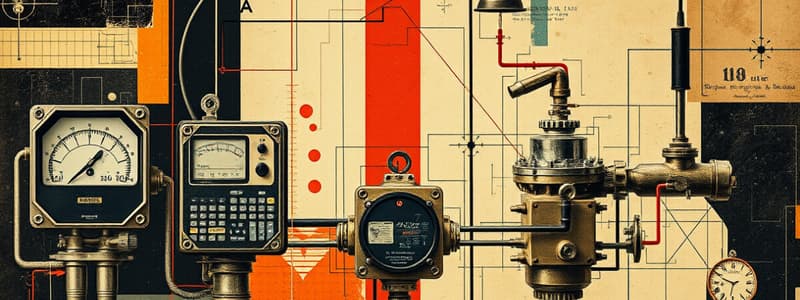Podcast
Questions and Answers
What is the output signal in mA for a 50% level input signal when using a 4-20 mA transmitter?
What is the output signal in mA for a 50% level input signal when using a 4-20 mA transmitter?
- 16 mA (correct)
- 10 mA
- 12 mA
- 8 mA
Which process variable primary sensors typically output signals in milli-volts?
Which process variable primary sensors typically output signals in milli-volts?
- Flow
- Temperature (correct)
- Level
- Pressure
What is the main purpose of a 'live zero' signal in process control?
What is the main purpose of a 'live zero' signal in process control?
- To prevent false readings when a sensor is malfunctioning (correct)
- To indicate a sensor's range of operation
- To provide a baseline measurement when no input is present
- To ensure calibration accuracy
What type of transducer is most commonly used in industry, and why?
What type of transducer is most commonly used in industry, and why?
Which of the following correctly defines LRV and URV in process instrumentation?
Which of the following correctly defines LRV and URV in process instrumentation?
What does equating the numerical value of one scale to its mathematical proportional value of another scale refer to?
What does equating the numerical value of one scale to its mathematical proportional value of another scale refer to?
A differential pressure transmitter is primarily used to measure which of the following?
A differential pressure transmitter is primarily used to measure which of the following?
Which statement is true regarding the integration of the primary sensor, transmitter, and transducer?
Which statement is true regarding the integration of the primary sensor, transmitter, and transducer?
Flashcards are hidden until you start studying
Study Notes
4-20 mA Transmitter Input and Output
- The transmitter operates within a 4-20 mA output range, corresponding to an input pressure range.
- At 0% level, input is 3 psi and output is 4 mA.
- 25% level reflects an output of 8 mA.
- 50% level translates to an output of 12 mA.
- 75% level corresponds to an output of 16 mA.
- 100% level signifies an output of 20 mA.
Process Variables and Sensor Signals
- Temperature, pressure, level, and flow are primary process variables with distinct sensors.
- Primary sensors for temperature typically output signals in milli-volts.
Purpose of “Live Zero”
- "Live zero" ensures there is always a minimum output signal (e.g., 4 mA) even when the measurement is at zero, enabling failure detection.
Common Type of Transducer in Industry
- The most prevalent type of transducer in industry is the pressure transducer.
- This is due to its critical role in measuring pressure for various applications and robustness in design.
Other Types of Transducers
- Two additional types of transducers include:
- Temperature transducer
- Level transducer
Definitions of LRV and URV
- LRV (Lower Range Value) is the lowest value of the measurement range.
- URV (Upper Range Value) is the highest value of the measurement range.
Scale Equating in Transducers
- Equating one scale's numerical value to the mathematical proportional value of another is known as linearization.
Differential Pressure Transmitter
- A differential pressure transmitter measures the difference in pressure between two points, critical for flow and level measurements.
True/False Statements
- True: Sometimes, the primary sensor, transmitter, and transducer can be integrated into a single device.
- True: The output of a transmitter generally spans from 0-100% of the measured process value.
Studying That Suits You
Use AI to generate personalized quizzes and flashcards to suit your learning preferences.




